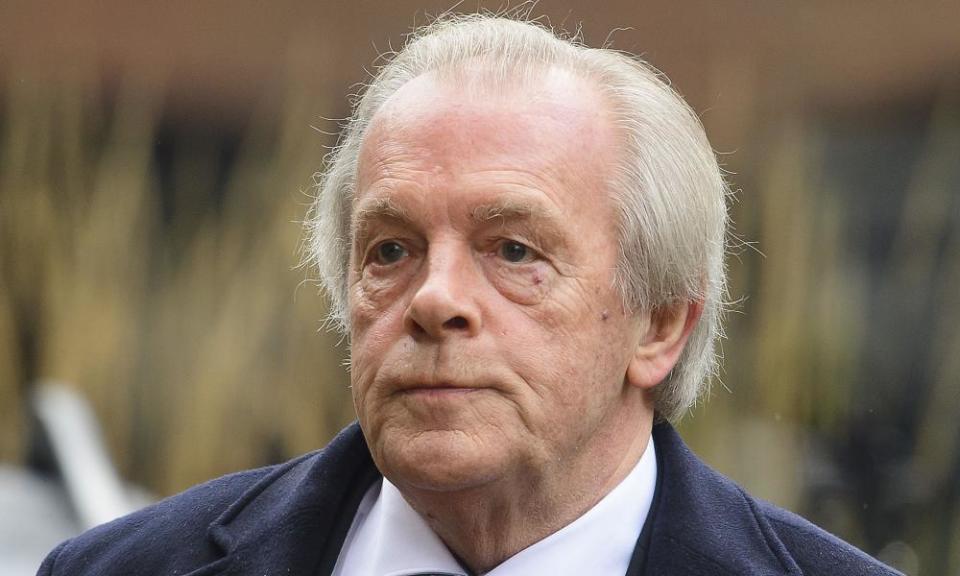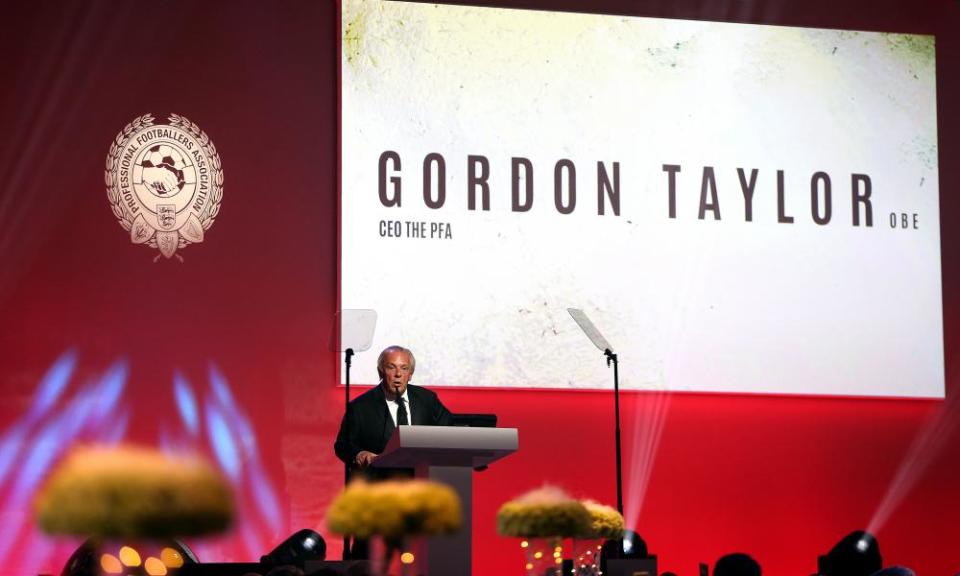PFA received complaint claiming Gordon Taylor referred to black footballers as ‘coloured’

Gordon Taylor’s leadership of the Professional Footballers’ Association is back in the spotlight after it emerged a complaint was made that he referred to black players as “coloured” at an event arranged to promote diversity and racial equality.
Taylor has told the PFA he cannot recall using the alleged term when giving a talk almost a year ago. A spokesperson for the players’ union said: “Gordon firmly believes he didn’t say it and it is not language he would ever use. He has led in this area for 40 years and understands fully the sensitivities.”
There is no suggestion that Taylor is racist. The claims – if true – could further fuel perceptions that his time as the PFA’s chief executive should end.
Over the past fortnight significant questions have been raised regarding the leadership of Taylor, who is facing a mutiny within his own ranks from members accusing him of holding back the PFA with outdated methods. The 73-year-old, the chief executive since 1981, has already bowed to demands for an independent inquiry into the way the PFA is run, with hundreds of present and former players signing a petition calling for him to end his long and often controversial tenure and recognise the organisation needs to be modernised.
The Guardian has spoken independently to four separate people who have provided near-identical claims of Taylor causing dismay with his choice of words among an audience largely made up of former professional sports people from BAME backgrounds.
Their individual accounts claim that they were so aggrieved about the use of the word “coloured” a complaint was made to a senior PFA official who is involved with On the Board, a training course which teaches former players about governance and has the specific aim of changing the culture in football so boardrooms are no longer filled exclusively with white faces.
According to individuals at the On the Board course, there was an audience of 10 to 15 people listening to Taylor on a day when the Football Association chairman, Greg Clarke, had also addressed the group. Taylor is a long-time supporter of diversity campaigns.
“They specifically encourage people from BAME backgrounds to go on this course to improve diversity on boards,” one person claimed. “They were talking about how they were trying to change things in football. Gordon went on to speak about football through the generations and black players coming through – except he didn’t say ‘black’ he said ‘coloured’. Everyone was looking at each other as if to say: ‘Oh my God’ ... people were really not happy.”

Another person attending the course said: “I felt sad. This is the leader of the PFA. We’re doing this course about personal development, ticking the right boxes. It left me wondering whether there are people in boardrooms, when there are no black people – are they are calling us ‘coloured’ too? It made me think I was wasting my time. I was disgusted by it.”
The accounts claim that a course leader raised the matter with a senior PFA official following complaints from people attending the event.
The PFA also acknowledged that it had been made aware of the issue, via that senior official, a few days after the event but reiterated that Taylor had insisted to his colleague that it was untrue.
Taylor’s recollection is that he asked the official to report back to the group that he would never say such a thing, and that was the last he had heard of it. He can remember having tea and biscuits with people from the group and that nobody complained to him at the time. According to the PFA, Taylor had sent on a message to the group that if there were any more issues, to let him know.
Although Taylor has received support from many members over the past two weeks, the PFA’s chairman, Ben Purkiss, has led the calls for change, placing a direct threat to the role of the man reputed to be the highest-paid union chief in the world, earning £2.29m a year but with his salary previously multiplying almost three fold, from £1.13m to £3.37m after bonuses.
Purkiss, in turn, has been the subject of an apparent attempt from Taylor to remove him as chairman, on the basis the 34-year-old defender is currently a non-contract player at Walsall. The PFA has said it sought advice from two QCs on the matter.
Taylor is facing a wide-ranging number of complaints about his leadership, among them the perceived failings of the PFA involving the studies into football-related dementia, the sexual-abuse scandal and the amount of money set aside for the many former players who may have mental health problems, serious financial difficulties and debilitating injuries.
His opponents have accused him of holding the organisation back and claims he used such a dated term about black players, almost seven years after Alan Hansen had to apologise for referring to “coloured” players on Match of the Day, will be particularly embarrassing bearing in mind Taylor was speaking at a PFA-funded course that has been championed by Kick It Out.
Chris Hughton, Ken Monkou and the late Ugo Ehiogu are among the former players to graduate since the course began in 2013 and, in Taylor’s words, it is particularly relevant because “presently, the dugouts and sidelines of football do not represent the diversity on the pitch”.
In December 2011 Hansen twice used the word “coloured” to describe black footballers on Match of the Day while discussing the racism incidents involving John Terry and Luis Suárez. The BBC received 82 complaints and a number of players expressed anger online. Hansen, who left his role as the show’s long-time pundit in 2014, said at the time: “I unreservedly apologise for any offence caused – this was never my intention and I deeply regret the use of the word.”
Taylor can point out he has been a supporter of anti-racism initiatives throughout his reign. He has also defended his leadership of the union, telling the Times last weekend: “I am fiercely proud of the support we give players day in, day out, the length and breadth of the country.”

 Yahoo Sport
Yahoo Sport 





































